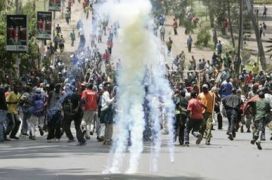Kenya opposition vows to hold rally, defy police
January 3, 2008 (NAIROBI) — Kenya’s opposition vowed to pour thousands of demonstrators on to the streets on Thursday after both sides traded accusations of genocide in post-election turmoil that has killed more than 300.
 The wave of riots and ethnic violence triggered by President Mwai Kibaki’s disputed re-election on Sunday has cut supplies of fuel and other goods to a swathe of central African countries and shocked world powers who called for reconciliation.
The wave of riots and ethnic violence triggered by President Mwai Kibaki’s disputed re-election on Sunday has cut supplies of fuel and other goods to a swathe of central African countries and shocked world powers who called for reconciliation.
Kenya is east Africa’s biggest economy and a key ally of the West in its counter-terrorism efforts. It is used to being the peacemaker, rather than the problem, on a volatile continent.
As both sides toughened their stance and rhetoric, the opposition said it would push ahead with a banned mass protest on Thursday in the centre of the capital Nairobi.
“There is no such law in Kenya that anybody cannot attend a political rally,” William Ruto, a senior official in opposition leader Raila Odinga’s party, told reporters.
“We have notified the police commissioner and he should live up to his duty of providing security when that meeting goes on.”
The police said the assembly was banned because they did not have the capacity to ensure security.
A local and an international rights group said “more than 300” people have died and accused Kenyan security forces of having “bloodily repressed” protests by opposition supporters.
Kibaki’s Kikuyu tribe was targeted in the initial clashes but revenge killings by Kikuyus are on the rise.
GENOCIDE, ETHNIC CLEANSING
The government said it was becoming clear that “well-organised acts of genocide and ethnic cleansing were well planned, financed and rehearsed” by leaders from Odinga’s Orange Democratic Movement (ODM) ahead of the election.
The opposition accused the government of acts “bordering on genocide” by ordering police to shoot protesters enraged by Kibaki’s victory at the polls. International observers said the Dec. 27 election fell short of democratic standards.
International efforts to mediate have been stepped up.
Nobel peace laureate Archbishop Desmond Tutu was due to meet the head of Kenya’s electoral commission on Thursday. Ghanaian President John Kufuor was waiting to talk to Kibaki before deciding whether to visit Nairobi himself or send a team.
British Foreign Minister David Miliband and U.S. Secretary of State Condoleezza Rice called for an end to violence and “an intensive political and legal process” to end the crisis.
The Kenyan government and religious figures urged local leaders to preach unity to ethnically polarised communities.
Kenyans are used to being viewed by the world as living in a stable democracy and an oasis of peace in a volatile region, and they will have been shocked by the use of the word “genocide”.
As young men armed with machetes manned roadblocks in rural areas for a third day running, the turmoil also hit financial and commodity markets.
The shilling dropped to a six-week low on Wednesday. Stocks also fell and tea and coffee auctions were postponed.
Late in the evening, Standard & Poor’s cut Kenya’s long-term local currency credit rating to ‘B+’ from ‘BB-‘, and said that if the violence was not resolved, the foreign currency credit rating could be lowered as well.
(Reuters)
